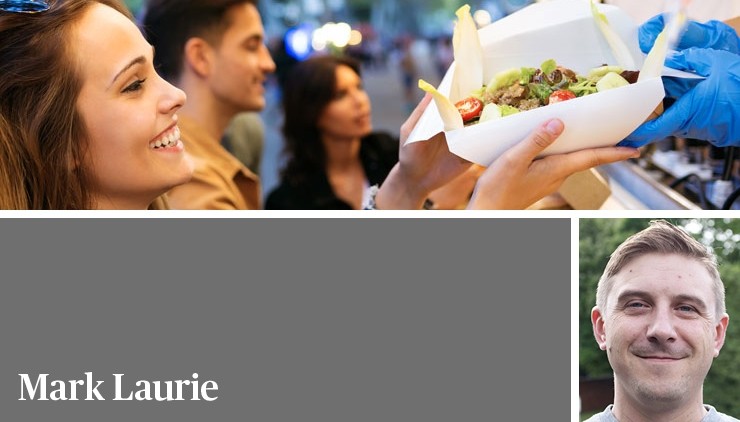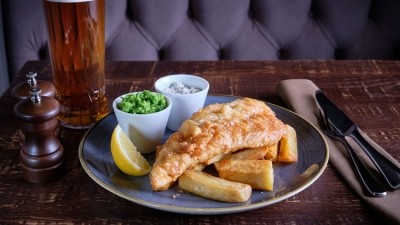comment
Caterers must adopt a model that has affordable food at its heart

The game has changed, the economy has changed, and the needs of the population have shifted immeasurably. Catering businesses that understand and support that shift will become vital to their communities during and after this crisis
The Coronavirus pandemic has already changed our daily lives to such an extent that conversations, concerns and aspirations that troubled us throughout winter and into the beginning of spring have now been replaced by cold, hard reality of ‘lock-down’,
UKHospitality has estimated that 500,000 people lost their jobs in the industry in February and March. The events industry has been shut down, corporate events cancelled, and street food markets or any type of mass gatherings are no longer able to take place leaving thousands of small catering businesses struggling to see light at the end of the tunnel.
Where possible, catering businesses have looked to find a way through this as the desire to keep staff and suppliers in business is almost universal. Some Nationwide Caterers Association (NCASS) members have investigated or signed up to delivery apps, have set up their own delivery services, diversified their menus, produced ‘heat at home food’, have started batch cooking and more. Many have offered to help those in greater need by dropping stock off at soup kitchens and food banks, as well as providing meals for NHS staff and others.
The well-known delivery apps have supported the F&B sector in recent weeks and are likely to get very busy as they increasingly become one of the few methods of reliably getting hold of food. It may end up being harder to stand out as the market becomes flooded with all the fast food classics that provide comfort and it must be said that people cannot live off the same takeaways for a prolonged period of time; it is a source of food designed to delight - a small treat in an increasingly uncertain world and that is why we need to ensure a wider group of caterers must be allowed to trade in the same way as the take away classics.
One of the key benefits of takeaway is time; when you order a delivery there is no time spent shopping, prepping, cooking or cleaning, you eat what you want, and the rest goes in the fridge or the bin. However, the one thing we all have now is time, lots of it in fact, but what many people are going to have less of is money.
What people will increasingly need is cost effective nourishment. We are likely to see a shift in demand, however, there is very little in terms of supply at present. Catering businesses should acknowledge this and cut their cloth accordingly as people need to stay as healthy as possible for the next few months and this means that eating well and worrying less are going to be critical to health.
More time may also mean more home cooking, or at least hopefully it will. However, many people will not currently be able to access healthy food, or simply do not have the knowledge to turn store cupboard ingredients into something tasty. They may not even have the resources or cooking equipment to produce much more than basics.
Will the cost of fresh food go up in the coming months as the globalised food system slows down? People will always need to eat but doing so could become increasingly costly in terms of money and health. This is where the mobile and independent catering sector needs to step in.
People need good, honest food that keeps them healthy, food that can be produced relatively affordably, and batch cooked, enabling better stock management and less waste.
Catering businesses need to cut their cloth
accordingly as people need to stay
as healthy as possible
The game has changed, the economy has changed, the country has changed. Flocking to the online marketplaces may be a short-term solution, however, what the country needs in this time of crisis is the kind of affordable home cooking that has been passed through the generations and done us all well.
There are also be those in urgent need; pensioners, people self-isolating, the recently redundant, the self-employed and people who were already struggling. There will be a need for affordable catering for these people. If the support is not available through government, people will be in dire straits.
There are the key workers and NHS staff, thousands of local authority staff, police, maybe even the army, will be on the streets or in hospitals delivering essential services to those in the most need. These people will also need affordable food at short notice and there are more than 10,000 caterers who are able to provide a much-needed service for the country at this time.
The food industry has been given key worker status - ironic considering we were told we were ‘unskilled’ by the home office just a few weeks ago. While we ask the government for support to our sector to stay solvent, we must also ask ourselves, how do we help our fellow citizens, what can we do that brings value and even moments of joy in these turbulent times, how can we be essential? The answer is to adopt a model that has affordable food at its heart.
Our members can become a service to their communities by offering click and collect healthy food, being creative with limited resources and delivering the food that the country needs now.
This is a national and international emergency akin to war. The needs of the population have shifted immeasurably, catering businesses that understand and support that shift will become vital to their communities during and after this crisis and we are determined to support them. NCASS have been and keep pushing for support for their members and in this context, we need easement to street trading regulations in line with concessions offered to other hospitality businesses.
A suspension of the red tape that might prevent caterers running delivery businesses or providing on site or emergency catering services to key workers is vital and NCASS’ key priority is to enable members to be able to trade, supporting themselves and their communities once again as soon as possible.
Mark Laurie is a director at The Nationwide Caterers Association














